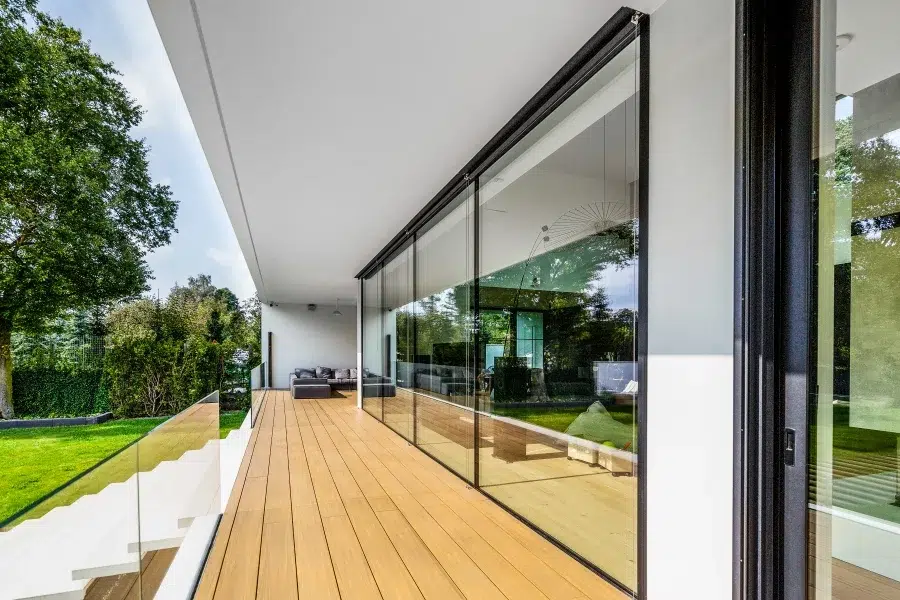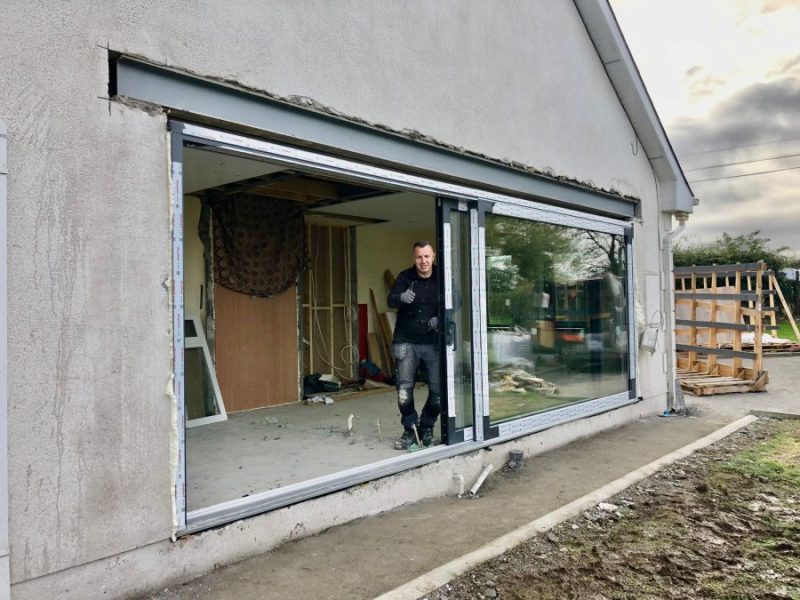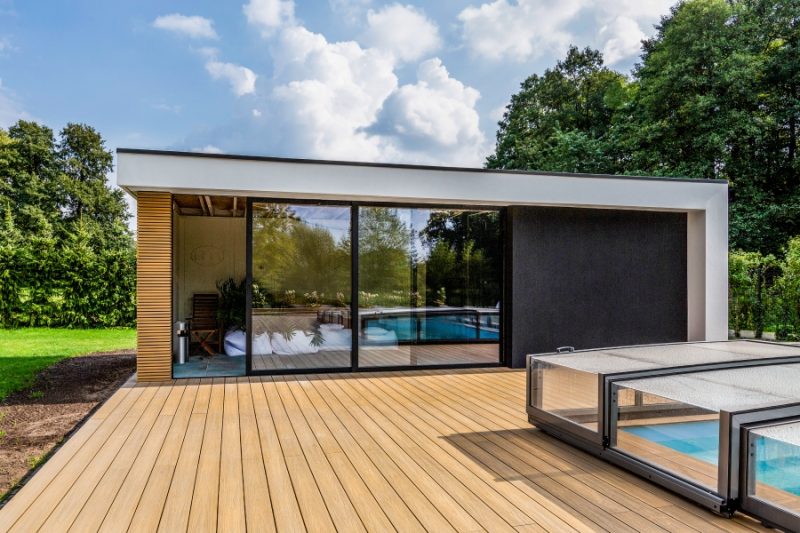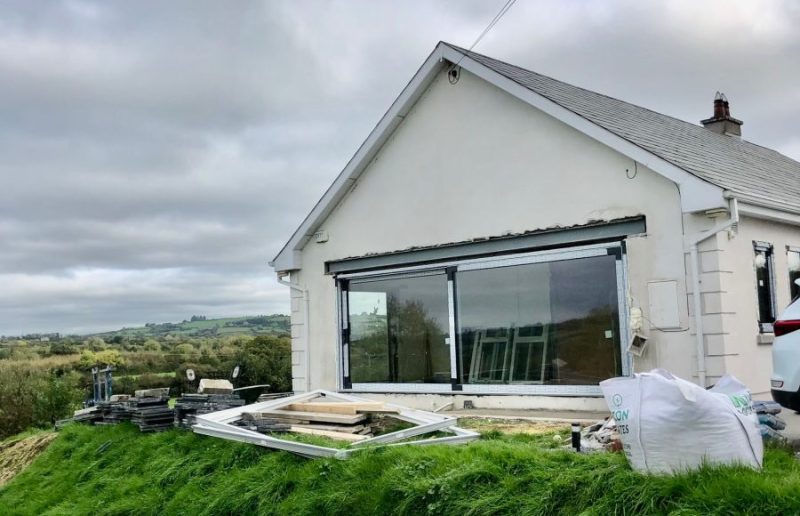Sliding doors are a popular and fashionable element of modern house or apartment designs. They gained popularity thanks to their functionality, ease of use and the ability to open the space to the surroundings. However, before we decide to purchase these comfortable and stylish sliding door solutions, it is worth asking the seller a few important questions. Here are 12 key considerations to help you decide how to buy doors wisely.
What are the disadvantages of sliding doors?
Ok, but first things first. Before any purchase, it’s always good to consider both advantages and disadvantages of the desired product. It is especially important in case of joinery – buying windows and doors is a huge investment and it should never be an impulse buy. If you don’t know how to buy doors that would fit your terrace or balcony perfectly, start with a good old pros and cons list. The main thing you should put in the cons column is surely maintenance. Let’s face it: the tracks and glass need to be taken care of regularly. It’s important to keep the tracks clean and lubricated in order for them to open and close easily. You’ll also need to clean the glass panes frequently if you want a spotless view of the outside. And the view sliding doors offer is really worth it! Some people are also worried about safety and wonder how do you secure a sliding glass door. In that case, it’s important to check beforehand how sliding doors close / open and lock and pay attention to the security features of the door you purchase.
How to choose a sliding glass door
Although sliding doors are one of the hottest design solutions to liven up the interiors, choosing the right door model is much more than just a matter of aesthetics. In addition to their attractive appearance, sliding doors must also fulfil many other functions, ensuring high comfort of use. Therefore, before making a purchase decision, it is worth planning this process thoroughly. Do you want to know how to choose a sliding patio door and make no mistakes in the process? What issues should accompany anyone who is considering purchasing sliding doors? What questions are worth asking to learn more about the available options and choose the solution that will best meet our expectations? Check our suggestions below!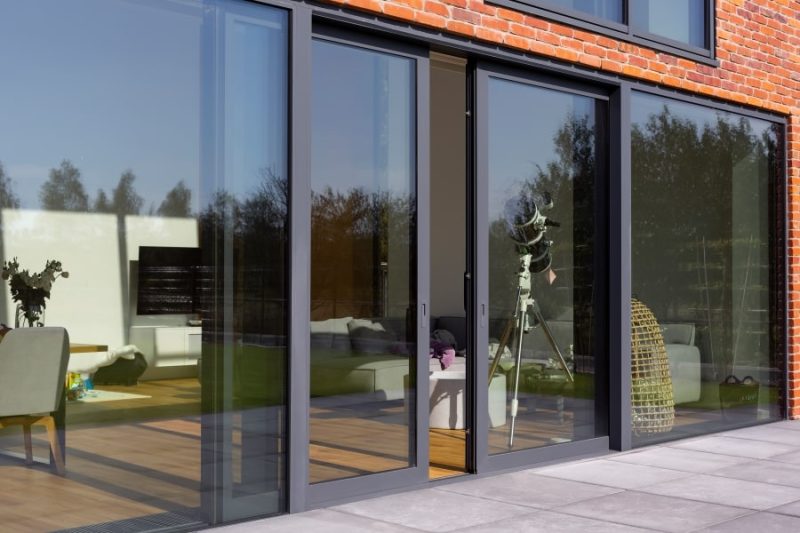
Question 1 – What type of sliding door is best?
Firstly, this question should refer to the most recommended door material for your house. The type of material the sliding door is made of affects its appearance, durability and insulation. Wood gives the interior warmth and elegance, aluminium is light and modern, and uPVC has good insulating properties. Secondly, you should rethink the sliding systems that would prove the most functional for your property.HST, PSK or smart slide – are you available with these terms? They differ in the opening and closing mechanisms, threshold heights and overall weight. If you want to get familiar with all these differences, read our previous blog article. In addition, there are price differences between individual systems. Therefore, always ask the seller what material the sliding system should be made of and what are the advantages of choosing different solutions and technologies.
Question 2 – How long should sliding doors last?
That’s the question combined closely with the previous one, especially in terms of the chosen sliding door material type. Remember that sliding doors with uPVC frames start to degrade only after more or less 30 years, and those with aluminium frames can last up to 50 years. Wooden frames in sliding doors, on the other hand, require more maintenance than plastic or aluminium ones, but they still last a long time. If provided with frequent upkeep, a good wooden window frame should last for 10 to 20 years on average. So, if you don’t know how to buy a sliding glass door that will satisfy your needs, start with the right door material type. The rightly chosen frame material is the key to success!
Question 3 – Are sliding doors efficient?
Frankly, it’s one of the most common customers’ doubts: doesn’t the higher ratio of glass in sliding doors decrease their energy-efficiency? Well, it is true that smaller panels of glass and more frames allow for less heat transfer – but don’t worry! Modern technologies and the vast types of available glazing units have allowed sliding doors to be as energy-efficient as other types of patio doors. However, In the case of sliding doors, it is always important to check whether they meet current thermal insulation standards. It is worth paying attention to the U-value (heat transfer coefficient), which measures the effectiveness of thermal insulation. The lower the value of this coefficient, the better the door insulates heat. Moreover, such sliding doors will help maintain a stable temperature in rooms, which, in turn, will reduce heating or cooling costs.
Question 4 – Is it hard to install a sliding door?
In addition to choosing the right sliding models, their correct installation is also important. When purchasing a sliding door system, always ask how the doors will be installed. Why? Well, simply because tight installation is crucial, especially if you want to provide protection against moisture, and airtightness, prevent heat loss and reduce cold bridges. The doors should be installed in accordance with the manufacturer’s recommendations. Incorrect installation will have an adverse effect on how the wings will look, slide (smooth/harsh slide) and function in the future. For example, the wrong level of the system during fitting has a huge impact on the insulation and lack of proper drainage outside the house (releasing water through the drainage holes). That’s why, if you have no experience in installing this type of doors, it is worth hiring an experienced fitting team. At Fenbro, we can recommend trusted professionals whose work meets industry standards. Professional installation affects the durability and reliability of your sliding doors. Ask our Sales Team!
Question 5 – How high should a sliding door threshold be?
When choosing sliding doors, it is also worth paying attention to the height of the threshold. If you want barrier-free access and comfort of use, make sure to choose a low threshold that will not create an obstacle to everyday use (flush threshold). Generally, we talk about low thresholds when the threshold is flushed with the level of the floor from the internal side of the room. Some patio doors can have thresholds flushed from inside and outside of the room. Such a solution might have an impact on the final price of the chosen solution. As Fenbro experts suggest, you can always ask for the exact dimensions of the threshold and check whether they are consistent with your expectations. This is especially important if you have children, elderly or disabled people at home and you want to create an easy-to-use and safe environment.
Question 6 – How large can a glass sliding door be?
Another important question to ask when you don’t know how to choose a sliding glass door is the availability of appropriate dimensions. The limitations on the size of glass sliding door systems can result not only from the architects’ project requirements, but also from road weight restrictions, limited site access or… the material the system is made of uPVC may be a good material for HST sliding doors but the advisable maximum width for such systems would be 4.5 metres. It results from the fact that the weight of the glazing units strongly influences the smooth movement of the active leaf. In the case of aluminium, there is no such relationship, and therefore, there are no limitations – the width of aluminium sliding systems may easily exceed 4.5 metres.
At Fenbro, we offer large-size sliding doors with a maximum height of construction and maximum width of leaf equal to 4 metres. It is worth remembering that glazing units constitute up to 70% of the weight of the entire system. As such size affects not only aesthetics, but also safety and comfort of use, you’ll probably want to know the answer to the following question: how do you secure a sliding glass door? In our opinion, it is always worth reducing the risk of damage to zero, right from the moment of packing the system onto pallets. While transporting such large sliding door systems, we pack the glazing units in transport frames to reduce the risk of damage to the system and the glazing unit itself.
Question 7 – Why is the sliding door fittings system important?
When purchasing sliding door systems, pay attention to the brand and quality of the fittings used, such as lock, material of the leaf rollers – steel, or aluminium, avoid those made of plastic. Remember that fittings from reputable suppliers guarantee not only durability, but also comfort of use. We recommend using reputable manufacturers who offer high-quality fittings systems. The latter has a significant impact on the durability of the door and its wear resistance. Moreover, make sure that the fittings system is integrated with the sliding door profile. Proper fit is crucial to ensure that the door operates smoothly and does not deform due to improper loading. What is more, depending on the type of sliding door, the fittings systems may differ in design and functionality (lift & slide, tilt & slide, slide etc.). When choosing sliding door fittings, pay attention to the appropriate adaptation to the type of door and installation method.
Question 8 – What type of glass is used on sliding doors?
We have no doubts in this matter: sliding glass doors must be equipped with toughened (tempered) glass (both from the external and internal side of the glazing unit). When the system exceeds 3000 mm in width, it is worth it to consider panes with 6 mm of thickness each. If you care about safety, it is worth finding out whether the glass used in the chosen sliding system is tempered, laminated or has a special foil protecting against possible damage. Tempered (or toughened) glass is strong and resists shattering. Instead, the glass will break into small, almost circular fragments. Similar to laminated glass, these safety glass types are less prone to inflicting bodily injury if they should break. Highly advisable!Additionally, pay attention to the insulated glazing units available with your chosen sliding door model (glazing units with 28 mm for double-glazed solution or 48 mm at least for triple-glazed units). The optimal Ug value for double-glazed units is 0.7 W/m2K, for triple-glazed units Ug 0.5 W/m2K Triple-glazed units are generally the best at preventing heat from escaping your home through the sliding doors. Triple glazing is the highest-rated option for energy efficiency, helping you save money on energy bills. If you want to learn some more detailed differences between double and triple glazing, go to this blog article.
Question 9 – Do sliding doors lock?
Safety is a priority, so you’ll surely want to ask your joinery supplier: how do sliding doors lock? You should also learn whether the sliding system you are interested in is equipped with appropriate anti-burglary protection, like handles with a key, knob, or with separate lock . Generally, you should be able to choose from special fittings (RC1, RC2, RC3 types), glass types or sensor systems (alarms in the door leafs). Locking mechanisms that make it difficult or impossible for an intruder to break in are also important. Generally, the most advanced and effective solution for securing sliding doors is a multi-point lock. This solution allows you to lock the door in several places using the main lock and two to four additional locks – they are placed along the edge of the door leaf on the front strip, and the mechanism is correlated thanks to the control strip. If we have a home alarm system installed, ask whether sliding doors can be integrated with this system. This will allow for immediate notification of an attempted break-in and will increase the level of security. Additional security may include the use of motion sensors or access control around sliding doors. This can be especially useful for large doors leading to a terrace or garden.
Question 10 – What is the best opening scheme for sliding doors?
The choice of sliding door opening scheme is important for the aesthetics of the facade and your house interior, but above all, it’s crucial for the functionality and ease of use of the entire sliding door system. Nowadays, it is possible to manufacture sliding doors in many opening configurations and arrangements of leafs and non-opening (fixed) parts. The movable parts can be tilted or slid together to the middle or to the sides, parallel to the fixed parts. Always ask whether the supplier offers a range of opening schemes that suit your preferences, available door opening and design solution of your chosen sliding door system. Whether you opt for a uPVC, timber or aluminium door frame, it is important that you choose the best configuration for you. At Fenbro, we offer a range of opening schemes, including two, three, four and six leafs, which combine either all moving or a combination of moving and fixed parts.
SLIDING DOORS OPENING SCHEMES
Question 11 – What can we equip sliding doors with?
Let’s face it: you may not know how to choose a sliding glass door properly, but you surely realise what functions it should have! That’s why once you decide on sliding doors, it is also worth considering the available additional equipment options. They will improve the comfort of use and adapt the doors to your individual needs. Choosing the right door handle is important both aesthetically and functionally. Modern sliding doors can be equipped with automatic opening and closing systems, which are especially useful for large and heavy doors, too. What is more, you can add a comfort close function (slowing down the door before closing the leaf, which prevents fingers from being trapped), additional rollers in the active leaf, allowing for smoother and more stable movement, various types of glazing (tempered glass, thermal glass, solar glass, venetian mirrors, etc.) or replace traditional handles with more functional pull handles.When thinking about living comfort, don’t forget about useful mosquito nets. They are an effective way to stop not only mosquitoes, but also all other bothersome or even potentially dangerous creatures that could enter your house. Sliding door mosquitos will secure your interiors at a low cost, without significant interference with the facade or windows. Check the offer of Fenbro mosquito nets here.
Question 12 – How much does a standard size sliding door cost?
Here’s the most important question everybody wants to know the answer to! Well, the truth is it all comes down to realising how much does it cost to make a sliding door. In other words, the price of new sliding doors largely depends on the material, size, glazing unit, glass type, brand, features and added accessories. Generally, if you want to know how much are new patio doors, you have to take into account the costs ranging from € 3000 – 11000. For example, you can get our bestselling uPVC Sliding Doors HST 85 mm in a triple-glazed version for either € 4084 (3000 x 2100 mm) or € 5874 (4000 x 2100 mm). As a comparison, Fenbro’s most popular Aluminium Sliding Doors MB-77HS with the same type of a glazing unit and dimensions (4000 x 2100 mm) will cost you even € 7264.
Sounds vague and imprecise? Well, the best idea would be to ask us for a quote on your chosen sliding door system! ! If you’re also wondering about the cost of installation, we can recommend trusted fitting teams and provide you with a general estimate based on previous customer experiences.
Summary: Are sliding doors a good idea?
If you ask us, we’ll say that sliding doors are the best home design choice if you dream about astonishing panoramic views and a closer connection with your garden or patio. They can be designed in a choice of configurations and sliding combinations, ensuring ease of operation with even the heaviest glass panels. Well-chosen sliding door systems will make your interiors seem bigger, as they maximise sunlight and help create the illusion of more space, while taking up only minimal internal space at the same time. Last but not least, sliding doors add value to your property, so they can make a great long-term investment as well. Check our wide offer of sliding doors and choose the best ones for you!Still don’t know what to consider when choosing sliding doors for your home? Reach out to Fenbro’s competent and helpful Customer Service. We’ll answer your questions quickly and precisely and will be there for you throughout the whole sales process – professionally and
effectively.

